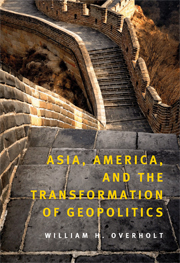Book contents
- Frontmatter
- Contents
- Figures
- Tables
- Preface
- Acknowledgments
- Overview
- CHAPTER ONE Introduction: The Inertia of Foreign Policies
- CHAPTER TWO Cold War Assumptions and Changing Realities
- CHAPTER THREE Regional Trends
- CHAPTER FOUR Asia's Big Powers: Japan and China
- CHAPTER FIVE Smaller Places, Decisive Pivots: Taiwan, Korea, Southeast Asia
- CHAPTER SIX The Aspiring Power and Its Near Abroad: India and South Asia
- CHAPTER SEVEN Russia and Its Near Abroad
- CHAPTER EIGHT The United States and the New Asia
- CHAPTER NINE Scenarios for the Future
- CHAPTER TEN Conclusion
- Bibliography
- Index
CHAPTER TEN - Conclusion
Published online by Cambridge University Press: 05 September 2012
- Frontmatter
- Contents
- Figures
- Tables
- Preface
- Acknowledgments
- Overview
- CHAPTER ONE Introduction: The Inertia of Foreign Policies
- CHAPTER TWO Cold War Assumptions and Changing Realities
- CHAPTER THREE Regional Trends
- CHAPTER FOUR Asia's Big Powers: Japan and China
- CHAPTER FIVE Smaller Places, Decisive Pivots: Taiwan, Korea, Southeast Asia
- CHAPTER SIX The Aspiring Power and Its Near Abroad: India and South Asia
- CHAPTER SEVEN Russia and Its Near Abroad
- CHAPTER EIGHT The United States and the New Asia
- CHAPTER NINE Scenarios for the Future
- CHAPTER TEN Conclusion
- Bibliography
- Index
Summary
The law that key institutions and images of one era survive into another era appears to be the political analogue of physics’ law of conservation of momentum. Old ideas burn themselves into the mind and can be excised only by some searing experience. Old institutions struggle to survive and mobilize supportive interest groups. Sometimes they transform themselves in ways that serve the national interest and sometimes they don't, but always they seek ways to justify themselves, to mobilize political and economic support, and to reshape themselves for survival. This is bedrock human behavior, and the Cold War institutions are no different from others.
ASEAN is a Cold War institution that has adapted itself in the face of multiple challenges. Organized with the support of the United States to create a barrier to Soviet, Chinese, and Vietnamese communist expansion, ASEAN was seen by its own leaders as a collaborative mechanism for enhancing the members’ prosperity through economic integration, increasing the small countries’ international security in the face of challenges from far bigger countries (primarily the Soviet Union and China), improving domestic security through exchange of intelligence and techniques, and magnifying their global diplomatic clout by banding together. The ASEAN leaders welcomed U.S. support against the communist international and domestic threats but always maintained their own autonomy.
With the fall of the Soviet Union and the evolution of China into a supporter of stability rather than a fount of subversion, ASEAN risked losing its reason for existence. With the Asian crisis and the resultant crippling of Indonesia and Thailand, it lost its leadership.
- Type
- Chapter
- Information
- Asia, America, and the Transformation of Geopolitics , pp. 295 - 306Publisher: Cambridge University PressPrint publication year: 2007



